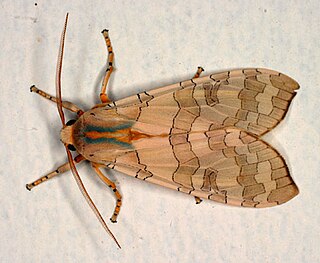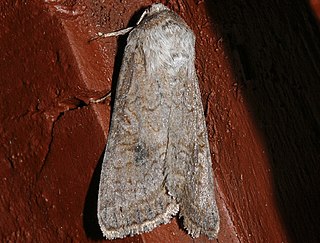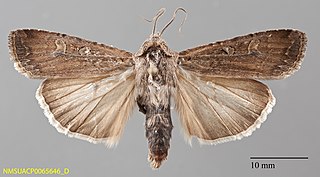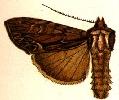
The Phaegopterina are a subtribe of tiger moths in the tribe Arctiini, which is part of the family Erebidae. The subtribe was described by William Forsell Kirby in 1892. 469 species of Phaegopterina are present and 52 that are recently discovered in Brazil.
Bendisodes is a monotypic moth genus in the family Erebidae erected by George Hampson in 1924. Its only species, Bendisodes aeolia, was described by Druce in 1890. It is found in North America.
Homolagoa is a monotypic moth genus of the family Noctuidae. Its only species, Homolagoa grotelliformis, is found in North America. Both the genus and species were first described by William Barnes and James Halliday McDunnough in 1912.
Hyperepia is a monotypic moth genus of the family Noctuidae erected by William Barnes and Arthur Ward Lindsey in 1922. Its only species, Hyperepia jugifera, was first described by Harrison Gray Dyar Jr. in 1920. It is found in North America.
Pseudhapigia is a monotypic moth genus of the family Notodontidae. Its only species, Pseudhapigia brunnea, is found in North America including its type location in Guadalajara, Mexico. The genus and species were first described by William Schaus in 1901.
Notela is a monotypic moth genus of the family Notodontidae. Its only species, Notela jaliscana, is found in North America. Both the genus and species were first described by William Schaus in 1901
Didugua is a monotypic moth genus of the family Notodontidae. Its only species, Didugua argentilinea, the silvered prominent, is found in North America. Both the genus and species were first described by Herbert Druce in 1891.
Amphipoea senilis is a species of cutworm or dart moth in the family Noctuidae. It was first described by Smith in 1892 and it is found in North America.

Trichordestra lilacina, the aster cutworm, is a species of cutworm or dart moth in the family Noctuidae. It is found in North America.

Euxoa inconcinna is a species of cutworm or dart moth in the family Noctuidae. It is found in North America.
Cucullia mcdunnoughi is a species of moth in the family Noctuidae. It is found in North America.
Lacinipolia circumcincta is a species of cutworm or dart moth in the family Noctuidae. It is found in North America.
Protogygia milleri is a species of cutworm or dart moth in the family Noctuidae. It is found in North America.

Hyppa xylinoides, known generally as the common hyppa or cranberry cutworm, is a species of cutworm or dart moth in the family Noctuidae. It is found in North America.

Coelodasys apicalis, the plain schizura, is a species of moth in the family Notodontidae. It was first described by Augustus Radcliffe Grote and Coleman Townsend Robinson in 1866, and is found in North America.

Plusia nichollae is a species of looper moth in the family Noctuidae. It is found in North America.
Eulithosia papago is a species of moth in the family Noctuidae. It was first described by William Barnes in 1907 and it is found in North America.

Copablepharon robertsoni is a species of cutworm or dart moth in the family Noctuidae. It is found in North America.

Elaphria exesa, the exesa midget moth, is a species of cutworm or dart moth in the family Noctuidae. It is found in North America.
Unciella flagrantis is a species of moth in the family Noctuidae. It is found in North America.






